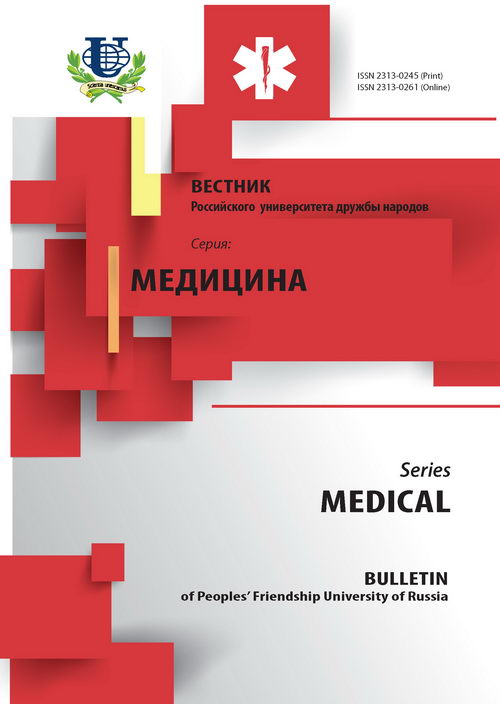Полиморфизм и полифункциональность антигенов АВО системы крови
- Авторы: Рыскина ЕА1, Чернов Н.Н.1, Епифанова АА2, Нефедова НС2
-
Учреждения:
- Российский университет дружбы народов
- Самарский ГМУ
- Выпуск: № 4 (2011)
- Страницы: 31-36
- Раздел: Статьи
- URL: https://journals.rudn.ru/medicine/article/view/3556
- ID: 3556
Цитировать
Полный текст
Аннотация
Ключевые слова
Об авторах
Е А Рыскина
Российский университет дружбы народов
Email: dar31@mail.ru <mailto:dar31@mail.ru>
Кафедра биохимииМедицинский факультет; Российский университет дружбы народов
Николай Николаевич Чернов
Российский университет дружбы народов
Email: olya.k@mail.ru <mailto:olya.k@mail.ru>
Кафедра биохимииМедицинский факультет; Российский университет дружбы народов
А А Епифанова
Самарский ГМУ
Email: dar31@mail.ru
Кафедра фундаментальной и клинической биохимии; Самарский ГМУ
Н С Нефедова
Самарский ГМУ
Email: dar31@mail.ru <mailto:dar31@mail.ru>
Кафедра фундаментальной и клинической биохимии; Самарский ГМУ
Список литературы
- Донсков С.И., Мороков В.А., Дубинкин И.В. Групповые антигены эритроцитов. Концепция совместимости. Руководство для иммуносерологов и трансфузиологов. - М., 2008. - С. 104.
- Bennett E., Steffensen R.,Clausen H. et al. Genomic cloning of the human histo-blood ABO locus // Biochem. Biophys. Res. Commun. - 1995. - Vol. 206. - P. 318-325.
- Минеева Н.В., Меркулова Н.Н., Хромова Е.А. и др. Случаи выявления редких вариантов антигена А // «Гематология и трансфузиология». - М., 2003. - Т. 48. - № 1. - С. 39-41.
- Шабалин В.Н., Серова Л.Д. Современные представления об антигенах крови человека // Российский вестник перинатологии и педиатрии. - 1996. - № 6. - С. 35-43.
- Loghem E. van, Wang A.C., Shuster J. A new genetic marker of human immunoglobulihs determined by an allele at the 2 locys // Vox Sang. - 1973. - 24.- C. 481.
- Шабалин В.Н., Шерман С.И. Некоторые особенности групповых (АВО) свойств крови у больных лейкозом // Сб. Вопросы лейкозологии. - Рига, 1969. - № 1. - С. 317-321.
- Schenkel-Brunner Н. Human blood grops // Chemical and Biochemical Basis of Antigen Specificity. - New-York, 2000. - P. 1001-1011.
- Yamamoto F., Marken J., Tsuji T. et al. Cloning and characterization of DNA complementary to human UDP-GalNAc: Fuc alpha 1----2Gal alpha 1----3GalNAc transferase (histo-blood group A transferase) mRNA // J. Biol. Chem. - 1990. - Vol. 265. - P. 1146-1151.
- Льюис С.М. Практическая и лабораторная гематология. - М.: ГЕОТАР-медиа, 2009. - С. 672.
- Hosoi E. Biological and clinical aspects ABO blood group system // Journal of Medical Investigation. - 2008. - V. 55. - P. 174-182.
- Yamamoto F., Mcnell P.D. Amino acid residue at codon 268 determines both activity and nucleotide-sugar donor substrate specificity of human histo-blood group A and B transferase // J. Biol. Chemical. - 1996. - Vol. 271. - P. 10515-10520.
- Оловникова Н.И., Николаева Т.Л. Антигены эритроцитов человека // Гематология и трансфузиология. - 2001. - Т. 46. - № 5. - С. 95-99.
- Минеева Н.В. Группы крови человека. Основы иммуногематологии. - СПб., 2004. - С. 188.
- Henry S.M. Freguencies of the Le(a-b-) phenotype in Polynesian ethnic groups // Transfusion. - 1957. - Vol. 35. - №.3. - P. 62-69.
- Донсков С.И. Группы крови в биологии человека - факты и предположения // Гематология и трансфузиология. - 2001. - Т. 48. - № 5. - С. 32-36.
- Федосеева В.Н., Порядин Г.В., Ковальчук Л.В. и др. Руководство по аллергологии и клинической иммунологии. - Львов, 1997. - С. 301.
- Мейл Д., Бростофф Дж., Рот Д.Б. et al. Иммунология / Пер. с англ.- М.: Логосфера, 2007. - С. 568.
- Иммунология / Под ред. У. Пола. - М.: Мир, 1987. - Т. 1. - С. 317.
- Anstee D.J. Blood-group active surface molecular of the human red blood cell // Vox Sang. - 1990. - V. 58. - P. 1-20.
- Сахаров Р.С., Кондратова И.В., Федулова М.В. и др. Современные представления о структуре и функции эритроцитарных антигенов // Судебно-медицинская экспертиза. - 1999. - № 6. - С. 29-32.
Дополнительные файлы















